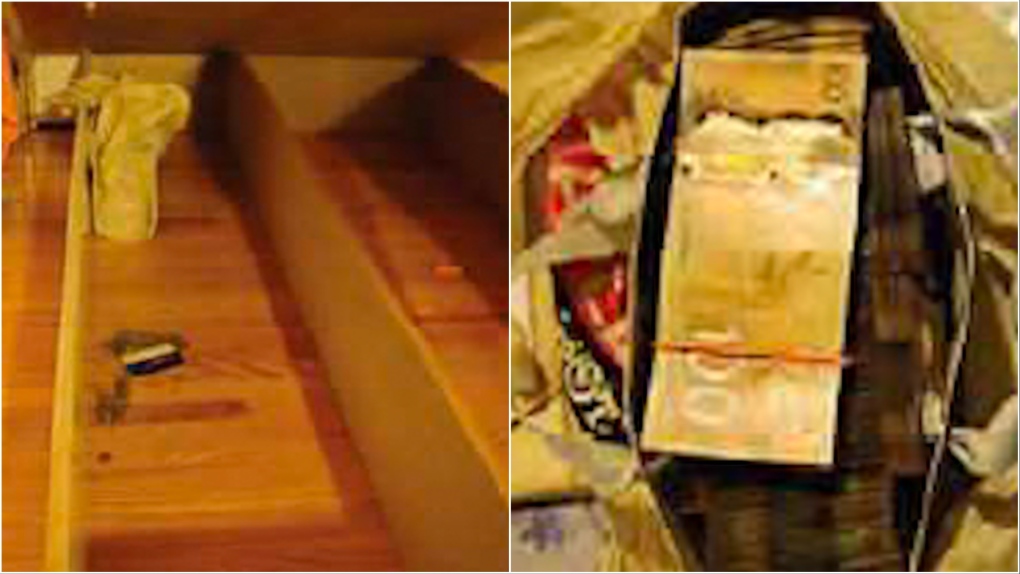$200K in cash found under retired construction worker's bed seized by authorities
An Ontario judge allowed authorities to seize about $200,000 found underneath a Mississauga man’s bed, saying even though it’s possible he distrusted banks after growing up in communist Czechoslovakia, the evidence in the case says it’s more likely the money came from an illegal gambling den.
Justice Dineen of the Ontario Superior Court said Dimitris Kellesis’ 92-year-old mother, Sotira, could keep $75,000, adding nothing tied her to any illegal activity during a multi-jurisdictional investigation touted at the time as a way to stop organized crime, but didn’t result in any convictions.
- Download our app to get local alerts on your device
- Get the latest local updates right to your inbox
“It’s the Eastern European way. You hide cash under the bed,” Lusi Brace, Kellesis’ lawyer, told CTV News Toronto in an interview. “There’s no law that says how you can save your money.”
Kellesis, a retired construction worker, was among dozens charged in Project Hobart, a massive investigation that dismantled what police said at the time was an underground gambling ring that supplied $160 million to chapters of the Hells Angels, masquerading as a Mississauga storefront.
But the investigation’s size may have been its undoing. Prosecutors at Brampton’s courthouse were unprepared for the volume of evidence, and the criminal case was eventually tossed out due to delays.
Using Ontario’s civil forfeiture rules, the province’s attorney general applied to seize the cash and other valuables discovered during the probe.
Among the items the province applied to keep was cash found in the Kellesis home: $20,000 found in a fanny pack, $1,910 found in a pair of jeans, and $250,000 found in a gift bag under a bed.
Surveillance officers saw Dimitris Kellesis attending the alleged gambling den on an almost daily basis. According to the judgement, he was seen using a money counter, locking doors, and using a tablet police believed was a ledger.
He argued at the hearing that he attended that storefront occasionally just to socialize and play an online game, “Clash of Clans,” on his tablet.
Dineen didn’t buy that argument, saying it was simply obvious that illegal gambling was going on — and that cash was likely proceeds of the gambling den.
“It is not credible that he spent many hours virtually every day at this ‘café’ as a mere social visitor who socialized or sat by himself playing a mobile video game and was entirely unaware that any gambling was taking place. This location was clearly a gambling hall with obvious gambling paraphernalia and Mr. Kellesis’s claim brings to mind Captain Renault in Casablanca,” the judge wrote.
But he was sympathetic to the arguments that when the family came to Canada from Czechoslovakia as a child, the family’s assets were seized by the then-communist government, leaving them suspicious of institutions.
 Dmitri Kellesis' seized cash is seen in this image.
Dmitri Kellesis' seized cash is seen in this image.
The judge accepted evidence that $75,000 of that cash could be traced to savings of his mother and sister.
“I accept on a balance of probabilities that $75,000 of the amount seized was legitimate savings of Ms. Kellesis with no link to illegal activity and I would order that amount returned to her,” he wrote.
Correction
A previous version of this story misspelled Kellesis' first name. The correct spelling is Dimitris.
CTVNews.ca Top Stories

WATCH LIVE Canadian government announces new border security plan amid Donald Trump tariff threats
The federal government has laid out a five-pillared approach to boosting border security, though it doesn't include specifics about where and how the $1.3-billion funding package earmarked in the fall economic statement will be allocated.
Fall sitting bookended by Liberal byelection losses ends with Trudeau government in tumult
The House of Commons adjourned on Tuesday, bringing an end to an unstable fall sitting that has been bookended by Liberal byelection losses. The conclusion of the fall sitting comes as Prime Minister Justin Trudeau's minority government is in turmoil.
Prosecutors charge suspect with killing UnitedHealthcare CEO as an act of terrorism
The man accused of killing UnitedHealthcare's CEO has been charged with murder as an act of terrorism, prosecutors said Tuesday as they worked to bring him to a New York court from from a Pennsylvania jail.
W5 Investigates How a convicted con artist may have exploited Airbnb's ID checks in rental scams
In part two of a W5 investigation into landlord scams, correspondent Jon Woodward looks at how hosts on Airbnb may be kept in the dark about their guests' true identities – a situation that a prolific Canadian con artist appears to have taken advantage of.
Alcohol is not good for us. 5 tips to stay safe(r) if you drink
The holidays and New Year’s Eve are fast approaching, and for many, that means alcohol-infused festivities and gatherings to navigate.
The world's busiest flight routes for 2024 revealed
If you think planes have got fuller and the skies busier over the past year, you’d be right — especially if you live in either Hong Kong or Taipei.
Sex-ed group deemed 'inappropriate' by Tory government returns to N.B. schools
A sexual-education group whose presentations were deemed "clearly inappropriate" by the previous New Brunswick Progressive Conservative government has been cleared to return to the province's schools.
Suspect in Gilgo Beach serial killings is charged in the death of a seventh woman
The New York architect facing murder charges in a string of deaths known as the Gilgo Beach killings was charged on Tuesday in the death of a seventh woman.
Number of family doctors in Canada now growing at a slower pace: report
Canada is facing a growing crisis in its health-care system as the rate at which family doctors are growing has slowed, according to a recent report.
































